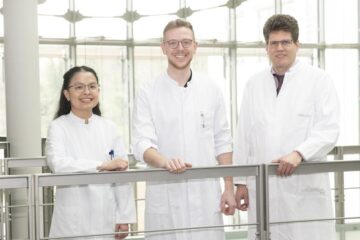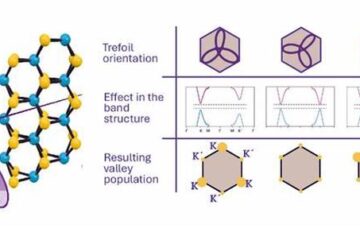Researchers discover normal version of molecular pathway affected in poor-prognosis childhood leukemia

Dartmouth researchers are trying to understand the key pathways that distinguish how a normal blood cell grows and divides compared to the altered growth that occurs in leukemia. In addition to the treatment of leukemia, the work has relevance for expanding umbilical cord blood or bone marrow stem cells for transplantation.
Leukemia often occurs due to chromosomal translocations, which are broken chromosomes that cause blood cells to grow uncontrollably. One gene that is involved in chromosomal translocations found at high frequency in childhood leukemia is the MLL1 (Mixed Lineage Leukemia 1) gene. Conventional chemotherapy is very ineffective at curing patients with this translocation, in contrast to other types of childhood leukemia, which are relatively curable.
Using genetic engineering, the researchers generated a mouse model to discover genes that are regulated by MLL1 in hematopoietic stem cells, the cells that give rise to all white and red blood cell types. In the course of these studies, they identified several unique properties of the normal MLL1 pathway in hematopoietic stem cells that may be exploited to better treat leukemia harboring MLL1 translocations.
“We discovered that many genes that depend upon the normal MLL1 protein are involved in maintaining hematopoietic stem cells, thus manipulating this pathway could be a way to expand cells from normal bone marrow or umbilical cord blood donors to improve transplantation of these cell types, which is a procedure used to treat certain chemotherapy-resistant cancers,” said Patricia Ernst, PhD, co-director Cancer Mechanisms, Dartmouth-Hitchcock Norris Cotton Cancer Center, associate professor of Genetics and of Microbiology and Immunology at the Geisel School of Medicine at Dartmouth, Hanover, NH.
As principle investigator, Ernst and her team set out to discover the genetic pathways controlled by the normal form of the MLL1 protein and leukemogenic MLL1 fusion proteins specifically in hematopoietic stem cells (HSCs). Delineation of these pathways will facilitate research by her group and others aimed at developing strategies to kill leukemia cells without harming HSCs, which are often profoundly affected by current chemotherapeutic regimens. In performing this research, they also discovered a new molecular pathway that controls normal HSC biology.
“We demonstrate in this study, that some direct MLL1 target genes in HSCs are affected by Menin loss (a protein involved in the inherited disorder, Multiple Endocrine Neoplasia), and some are not,” said Ernst. “This is a fundamentally important observation that demonstrates this category of chromatin modifiers utilizes different protein complexes/mechanisms to target different classes of genes in different cell types.”
Ernst points out that this highly desirable outcome that would not have been predicted for this targeted therapy and may illustrate that drugs blocking the interaction of these two proteins (currently under development by other groups) leave normal hematopoiesis intact. She is working on follow-up studies of this finding.
Research funded by NIH HL090036 and RR16437 as well as additional grants from American Cancer Society, Gabrielle’s Angel Foundation for Cancer Research, Lady Tata Memorial Trust, and the Lauri Strauss Leukemia Foundation.
About Norris Cotton Cancer Center at Dartmouth-Hitchcock
Norris Cotton Cancer Center combines advanced cancer research at Dartmouth College and the Geisel School of Medicine at Dartmouth College with patient-centered cancer care provided at Dartmouth-Hitchcock Medical Center, at Dartmouth-Hitchcock regional locations in Manchester, Nashua, and Keene, NH, and St. Johnsbury, VT, and at 12 partner hospitals throughout New Hampshire and Vermont. It is one of 41 centers nationwide to earn the National Cancer Institute's “Comprehensive Cancer Center” designation. Learn more about Norris Cotton Cancer Center research, programs, and clinical trials online at cancer.dartmouth.edu.
For more information contact Donna Dubuc at (603) 653-3615.
Media Contact
More Information:
http://www.hitchcock.orgAll latest news from the category: Health and Medicine
This subject area encompasses research and studies in the field of human medicine.
Among the wide-ranging list of topics covered here are anesthesiology, anatomy, surgery, human genetics, hygiene and environmental medicine, internal medicine, neurology, pharmacology, physiology, urology and dental medicine.
Newest articles

Targeted use of enfortumab vedotin for the treatment of advanced urothelial carcinoma
New study identifies NECTIN4 amplification as a promising biomarker – Under the leadership of PD Dr. Niklas Klümper, Assistant Physician at the Department of Urology at the University Hospital Bonn…

A novel universal light-based technique
…to control valley polarization in bulk materials. An international team of researchers reports in Nature a new method that achieves valley polarization in centrosymmetric bulk materials in a non-material-specific way…

How evolution has optimised the magnetic sensor in birds
The magnetic sense of migratory birds is probably based on the protein cryptochrome 4, and a genetic study has now provided further support for this theory. A team of researchers…





















